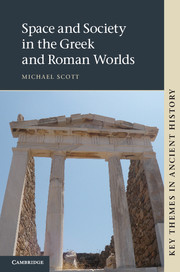Feedback


Space and society in the Greek and Roman worlds / Michael Scott
Gespeichert in:
| Autor:in: | |
|---|---|
| Sprache: | Englisch |
| Veröffentlicht: | Cambridge [u.a.] : Cambridge Univ. Press, 2013 |
| Ausgabe: | 1. publ. |
| Schriftenreihe: | Key themes in ancient history
|
| Umfang: | XVII, 212 S. : Ill., Kt. ; 23 cm |
| ISBN: | 9781107401501 110740150X 9781107009158 1107009154 |
| Anmerkungen: | Includes bibliographical references |
| Schlagwörter: | |
| Basisklassifikation: | |
| Mehr zum Titel: | Machine generated contents note: Introduction; 1. Inheriting and articulating a community: the agora at Cyrene; 2. Networks of polytheism: spaces for the gods at Delos; 3. Spaces of alienation: street-lining Roman cemeteries; 4. A spatial approach to the relationships between colony and metropolis: Syracuse and Corinth; 5. The place of Greece in the oikoumene of Strabo's Geography; Conclusion: space and society in the Greek and Roman worlds. |
| Zusammenfassung: | "We cannot properly understand history without a full appreciation of the spaces through which its actors moved, whether in the home or in the public sphere, and the ways in which they thought about and represented the spaces of their worlds. In this book Michael Scott employs the full range of literary, epigraphic and archaeological evidence in order to demonstrate the many different ways in which spatial analysis can illuminate our understanding of Greek and Roman society and the ways in which these societies thought of, and interacted with, the spaces they occupied and created. Through a series of innovative case studies of texts, physical spaces and cultural constructs, ranging geographically across North Africa, Greece and Roman Italy, as well as an up-to-date introduction on spatial scholarship, this book provides an ideal starting point for students and non-specialists"-- "We cannot properly understand history without a full appreciation of the spaces through which its actors moved, whether in the home or in the public sphere, and the ways in which they thought about and represented the spaces of their worlds. In this book Michael Scott employs the full range of literary, epigraphic and archaeological evidence in order to demonstrate the many different ways in which spatial analysis can illuminate our understanding of Greek and Roman society and the ways in which these societies thought of, and interacted with, the spaces they occupied and created. Through a series of innovative case studies of texts, physical spaces and cultural constructs, ranging geographically across North Africa, Greece and Roman Italy, as well as an up-to-date introduction on spatial scholarship, this book provides an ideal starting point for students and non-specialists"-- |
